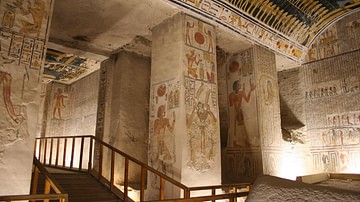Exploring the dark side of ancient Egyptian history, we delve into the illicit world of tomb robbing. Unveiling a hidden narrative that often goes untold, this article sheds light on the nefarious activities that plagued the sacred resting places of pharaohs and nobles.
Ancient Secrets Plundered
Intriguingly, numerous tombs across ancient Egypt were targeted by audacious thieves seeking to exploit their treasures. These cunning criminals would stop at nothing to gain access to these hallowed grounds, defying both societal norms and divine retribution.
With minimal tools and a disregard for ethical boundaries, these tomb robbers meticulously planned their raids. They navigated through labyrinthine passages with precision, bypassing intricate traps designed to protect the deceased from desecration.
Once inside these sacred chambers, they ransacked burial goods such as jewelry, amulets, and precious metals. The stolen items were then sold on black markets or smuggled abroad – forever severing them from their historical context.
An Enduring Battle Against Thieves
The authorities in ancient Egypt recognized the gravity of this issue and implemented various measures to combat tomb robbery. Pharaohs employed skilled artisans who crafted false doors within tombs – an attempt to confuse potential thieves about which chamber held valuable artifacts.
In addition to physical deterrents like concealed passageways and hidden compartments within tombs themselves, curses were inscribed upon walls warning intruders of dire consequences should they disturb eternal rest. These supernatural threats aimed to dissuade even the most audacious criminals from attempting theft.
Despite these efforts, however, some determined individuals managed to evade detection and successfully pilfer priceless antiquities. Their actions not only disrupted the sanctity of these sacred spaces but also erased valuable historical information that could have enriched our understanding of ancient Egyptian culture.
A Legacy of Loss
The impact of tomb robbing in ancient Egypt is immeasurable. Countless treasures were lost forever, leaving gaps in our knowledge and appreciation for this remarkable civilization. The thefts continue to haunt us today as we grapple with the consequences of these illicit activities on our understanding of history.
As we strive to protect and preserve cultural heritage, it is essential to acknowledge the dark chapters that mar its legacy. By shedding light on tomb robbery in ancient Egypt, we honor those who fought against such crimes and work towards a future where our shared past remains intact for generations to come.
